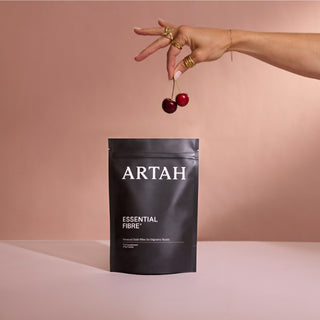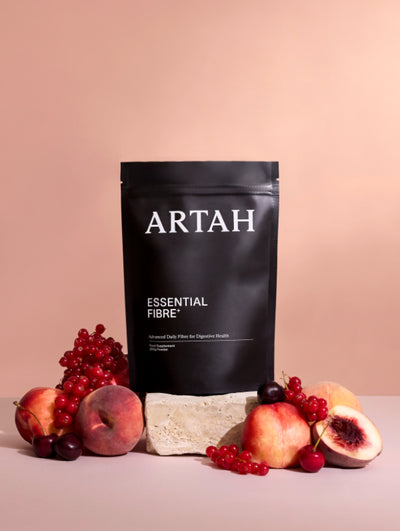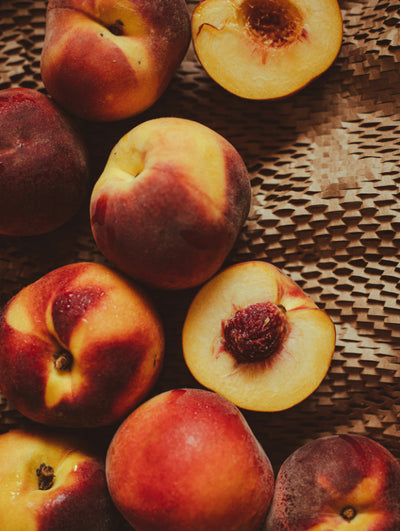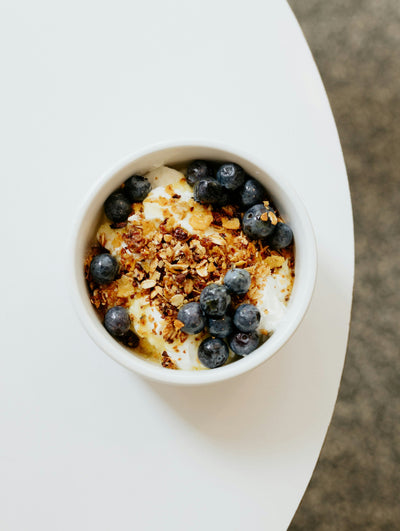Eating seasonally simply means consuming fruit and vegetables that align with the season they’ve been harvested in, as opposed to eating those that have been shipped across the world. Better for the environment and local producers, seasonal foods are also tastier, more nutritious – they’re ripe with vitamins, minerals and antioxidants – and cost effective.
When it comes to gut health, the more plants we eat, the better. Fruit, vegetables and legumes are all packed with prebiotics and fibre that feed the trillions of bacteria in our microbiome, leading to increased microbial diversity and a healthier gut lining. Studies have found that plant-based diets also increase the production of short-chain fatty acids, which can help reduce systemic inflammation in the body. (1)
So, what are the best seasonal foods that can help nurture your gut and improve your wider health? Here are some of our favourites – many of which you can find included in the recipes from some of our health programmes.
Asparagus
Only in season for a couple of months in the UK, asparagus is rich in folate, vitamin K and potassium, not to mention the prebiotic inulin, which has been shown to have a positive effect on gut motility and bacterial diversity in the gut. Pack their plant power in at breakfast, where they make excellent “soldiers” in tandem with your dippy eggs. (2)
Radishes
A crunchy cruciferous vegetable, radishes are brilliant at assisting with the body’s natural detoxification processes, thanks to the fact they’re rich in sulphur-containing glucosinolates – studies on which have shown positive impact on an array of illnesses, including depression, multiple sclerosis and other chronic diseases. Chop them up finely and add to salads. (3)
Rhubarb
As well as being full of fibre – so great for healthy digestion and a thriving gut microbiome – rhubarb is antioxidant-rich (anthocyanins create its red colour) and has antibacterial and anti-inflammatory properties that can help ward off illness. You can – quite easily – grow it yourself, too. (4)
Beetroot
From supporting digestion to promoting healthy bowel movement, the fibre in beetroot is brilliant for our gut bacteria, while antioxidants and natural nitrates help reduce inflammation and support detoxification. Studies have also shown that it’s brilliant to help improve cognitive function and exercise performance, plus it can protect the liver and kidneys. (5)
Mint
Whether you brew it in a tea or chop into a spring salad, mint is a brilliant herb for the digestive system. It helps alleviate indigestion (and assists normal digestion), plus it also offers calming, anti-spasmodic effects, reducing the risk of discomfort and bloating. (6)
Strawberries
A great British treat in the warmer months, strawberries are full of fibre and brilliant for gut health. In fact, one study found that increased consumption of strawberries (both fresh and freeze-dried) improved the gut microbiota in healthy elderly people. (7) If you’re worried about strawberries and pesticides, this is one of the times it’s worth investing in organic.
Artichokes
Another vegetable that’s high in inulin, Jerusalem artichokes are great for all aspects of digestive health – they get things moving and can combat constipation too, while inulin helps fortify the intestinal barrier. (8)
References
-
Sidhu SRK, Kok CW, Kunasegaran T, Ramadas A. Effect of Plant-Based Diets on Gut Microbiota: A Systematic Review of Interventional Studies. Nutrients. 2023 Mar 21;15(6):1510. doi: 10.3390/nu15061510. PMID: 36986240; PMCID: PMC10057430.
-
Le Bastard Q, Chapelet G, Javaudin F, Lepelletier D, Batard E, Montassier E. The effects of inulin on gut microbial composition: a systematic review of evidence from human studies. Eur J Clin Microbiol Infect Dis. 2020 Mar;39(3):403-413. doi: 10.1007/s10096-019-03721-w. Epub 2019 Nov 9. PMID: 31707507.
-
Connolly EL, Sim M, Travica N, Marx W, Beasy G, Lynch GS, Bondonno CP, Lewis JR, Hodgson JM, Blekkenhorst LC. Glucosinolates From Cruciferous Vegetables and Their Potential Role in Chronic Disease: Investigating the Preclinical and Clinical Evidence. Front Pharmacol. 2021 Oct 26;12:767975. doi: 10.3389/fphar.2021.767975. PMID: 34764875; PMCID: PMC8575925.
-
Xiang H, Zuo J, Guo F, Dong D. What we already know about rhubarb: a comprehensive review. Chin Med. 2020 Aug 26;15:88. doi: 10.1186/s13020-020-00370-6. PMID: 32863857; PMCID: PMC7448319.
-
Chen L, Zhu Y, Hu Z, Wu S, Jin C. Beetroot as a functional food with huge health benefits: Antioxidant, antitumor, physical function, and chronic metabolomics activity. Food Sci Nutr. 2021 Sep 9;9(11):6406-6420. doi: 10.1002/fsn3.2577. PMID: 34760270; PMCID: PMC8565237.
-
Scarpellini E, Broeders B, Schol J, Santori P, Addarii M, Boccuto L, Carbone F, Abenavoli L, Tack J. The Use of Peppermint Oil in Gastroenterology. Curr Pharm Des. 2023;29(8):576-583. doi: 10.2174/1381612829666230328163449. PMID: 36994979.
-
Meiners F, Kreikemeyer B, Newels P, Zude I, Walter M, Hartmann A, Palmer D, Fuellen G, Barrantes I.2025.Strawberry dietary intervention influences diversity and increases abundances of SCFA-producing bacteria in healthy elderly people. Microbiol Spectr13:e01913-24.https://doi.org/10.1128/spectrum.01913-24
-
Sasaki H, Lyu Y, Nakayama Y, Nakamura F, Watanabe A, Miyakawa H, Nakao Y, Shibata S. Combinatorial Effects of Soluble, Insoluble, and Organic Extracts from Jerusalem Artichokes on Gut Microbiota in Mice. Microorganisms. 2020 Jun 24;8(6):954. doi: 10.3390/microorganisms8060954. PMID: 32599833; PMCID: PMC7356569.
Disclaimer: The information presented in this article is for educational purposes only and is not intended to diagnose, prevent, or treat any medical or psychological conditions. The information is not intended as medical advice, nor should it replace the advice from a doctor or qualified healthcare professional. Please do not stop, adjust, or modify your dose of any prescribed medications without the direct supervision of your healthcare practitioner.


















































